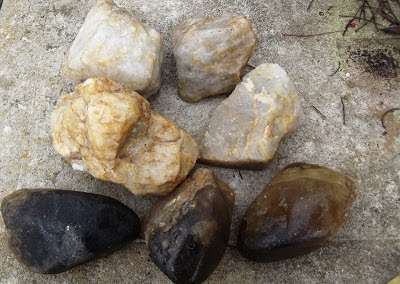QUARTZ AT “DOWN THE HILL” YARROW CREEK
NSW AUSTRALIA
Any fossicker visiting Yarrow Creek soon notices
that at least 90% of the gravel he or she digs up is made of quartz, with the
balance usually consisting of granite and odd bits and pieces which are
probably xenoliths derived from the local granite. So what, you are probably
thinking. Well, the fact is that the size of most of the quartz pieces is
considerably greater than the quartz which is a normal constituent of the
granite. The sand, so plentiful in the creek is, of course, derived from the
granite.
So, where does the quartz gravel come from? The
obvious answer is, from veins and/or pegmatite dykes in the granite. However,
no granite outcrop that I’ve ever seen there has any veins or dykes in it. So
if these quartz veins do exist, they must be in places where there are no
outcrops.
“Down the Hill” is one such place. There is an
extensive alluvial flat immediately upstream of a rocky area where lots of
gravel can be found (in the rocky area that is).
What makes this gravel different is the presence of lots
of chunks of white quartz (up to 1 kg in weight) which is different from the
small pieces of quartz seen upstream. It would be reasonable to assume, from its
rough appearance, that the quartz hasn’t travelled very far.

Not only that, but there are other pieces of
quartz which are distinctly different from the white ones. Each of these is a
single, waterworn, smoky crystal; the largest of which I’ve seen weighs just
under 5 kg. Most of these are not particularly clear, but certainly worth
finding.

So, apparently, there must be at least two quartz
veins or dykes not far upstream from “Down the Hill” which are shedding this
material.
I guess we will never really know.
You will find the NSW Geological Survey booklet “Silica”
by DK Griffin (1972) a useful source of information. The DIGS reference is
Industry 34.
Why not check out my You Tube
channel here.
All New England and other Geology blogs and videos
https://johnsbluemountainsblog.blogspot.com/2013/12/links-to-all-blog-entries-and-relevant.html All Blue Mountains blogs and videos
All New England and other Geology blogs and videos
Limestone Caves of NSW
Song Studies. Bible studies based on hymns and songs
Shoalhaven District Geology.



No comments:
Post a Comment